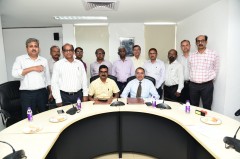- University of Sunderland Delegation Visits Kings Cornerstone International College to Meet Future Transfer Students
- Paintings by Maud Lewis Lead The Way in Miller & Miller's Successful Online Auction Held April 13th
- GD Goenka University Inaugurates State-Of-The-Art Health & Wellness Centre In Association With Park Hospital
- Betachon Freight Auditing Announces Exclusive Discount Ocean Freight Rates with DHL International Shipping
- Nourhan Rabah Bureau Redefines Urban Living in Dubai
- TiDB by PingCAP Leads Data Management Revolution at Great International Developer Summit 2024
- University of Birmingham Dubai invites applications for MSc Computer Science
- MindCypress Unveils Enhanced Advanced Digital Marketing Course with AI and ChatGPT Integration
- Launch of the book- A Monk with a Merc by Dr Gauravv Mittal Adit Mittal
- Elios 3 Drone Payload for UTM Introduced by Flyability and Cygnus
- Exterior Plas Marks 36 Years as Industry Leader in Windows, Doors and Glazing
- CD Bioparticles Announces Versatile Basic Agarose Particles for Efficient Biomolecule Separation
- Radisson Hotel Group strengthens its footprint in Delhi with the signing of Svelte Delhi
- Zee Business guides Investors to Navigate the Market with Confidence this Election Season
- Sandeep Marwah Inaugurates Scouts & Guides Marching Band at AAFT
 Mail to a Friend Mail to a Friend |
|
     |
ICRIER moots five point policy for a regulation and pricing of the Indian alcoholic beverages sector
New Delhi, July 23, 2021? Leading Indian economic think tank, the Indian Council for Research on International Economic Relations (ICRIER) has proposed a five point policy for developing a transparent and predictable regulatory and pricing framework for the Indian alcoholic beverages sector.
In a report entitled ?Developing Principles for Regulation of Alcoholic Beverages Sector in India?, jointly developed with PLR Chambers, ICRIER said that the government should develop transparent and predictable policies, focus on technology-enabled interventions, enhance the use of data-driven models, engage in regular consultation with stakeholders, and implement phased reduction in tariffs for the Indian alcoholic beverages sector.
The report was released by ICIER Chairperson Pramod Bhasin in New Delhi Today. The release was followed by a panel discussion on ?Doing Business in India: Regulation & Pricing of Alcoholic Beverages?.
Eminent personalities including Rajiv Mehrishi, Former Comptroller & Auditor General of India, Nita Kapoor, CEO, International Spirits and Wines Association of India (ISWAI), Dr. Sudipto Mundle, Senior Adviser, National Council of Applied Economic Research (NCAER), and Vinod Giri, Director General, Confederation of Indian Alcoholic Beverage Companies (CIABC) participated in the discussion. The panel discussion was moderated by Suhaan Mukerji, Managing Partner, PLR Chambers.
This report is a first of its kind attempt to develop transparent principles for regulation and pricing of alcoholic beverages sector in India. It can provide the basis for designing policies and pricing models for different states.
Speaking on the occasion, Dr. Deepak Mishra, Director and Chief Executive, ICRIER, said: ?Excessive, unpredictable and opaque regulations and tax policies have contributed to high cost of doing business in India?s alcoholic beverages sector. By analysing the best practices at home and abroad, this report has made the five broad policy recommendation that would go a long way in helping this sector.?
India is one of the world?s fastest growing markets for alcoholic beverages with an estimated market size of $52.5 billion in 2020. The market is expected to grow at a CAGR of 6.8 per cent between 2020 and 2023. Production of alcoholic beverages increased by about 23.8 per cent between 2015-16 and 2018-19 and the sector generated around 1.5 million jobs and $48.8 billion in sales revenue in 2019. This sector is among the top three revenue earning sectors of the states. In the current situation of pandemic, more than 21 states have changed their policies to allow home delivery or imposed a corona cess to mitigate the revenue shortfall. However, in some cases, the study found that, it has led to lower revenue earnings. Thus, policies may not be achieving the desired objectives.
The report has suggested how state governments can learn from global best practices. It provides a model for taxation for the state governments that is based on evidence and data. In addition, the report also recommends customising global best practices to suit the requirements of the respective states to develop a predictable and transparent pricing model that will enable the government to meet its objectives of earning higher revenue, address consumer health and safety concerns, increase investment in manufacturing in line with the ?Make in India? initiative, create employment, bring in foreign direct investment and increase exports.
The report encourages evidence-based policymaking, and in setting the stage for dialogue and discussion towards creating a predictable environment in the alcoholic beverages sector. The recommendations put forward in this report are aimed at helping the state governments in attracting more investment, create employment, expand the manufacturing potential and create an overall predictable policy regime and ease of doing business and enhance India?s position in the global rankings. As India is trying to re-start its trade negotiations with key partners like the European Union and Australia, tariff reductions will be a key area for discussion and this report provides a mutually beneficial tariff reduction framework, which can promote exports.
The report pointed out that the number of people consuming alcohol increased from approximately 219 million in 2005 to 293 million in 2018. It was projected to increase to 386 million by 2030. While consumption of spirits dominates the Indian market, its share in volume terms has decreased during 2013-2018; share of beer consumption has increased, while that of wine has remained almost constant. The primary survey shows that over 70 per cent of the growth in alcoholic beverages consumption in India in the next decade will be driven by the lower middle and upper middle income groups, and there is a growing trend towards product premiumisation. By 2030, 50 per cent of consumers are expected to buy more of the same category of alcoholic beverages that they were consuming, 26 per cent are estimated to move to higher brands, and 24 per cent are expected to spend on newer categories of alcoholic beverages.
The report also highlighted some key barriers that the sector was facing which includes regulatory barriers and several variations across states, price control barriers and high import tariffs.
About ICRIER:
Established in August 1981, ICRIER is an autonomous, policy-oriented, not-for-profit, economic policy think tank. ICRIER?s main focus is to enhance the knowledge content of policy making by undertaking analytical research that is targeted at informing India?s policy makers and also at improving the interface with the global economy.
To effectively disseminate research findings, ICRIER organises workshops, seminars and conferences to bring together academicians, policymakers, representatives from industry and media to create a more informed understanding on issues of major policy interest. ICRIER routinely invites distinguished scholars and policymakers from around the world to deliver public lectures and give seminars on economic themes of interest to contemporary India.
About PLR Chambers:
PLR Chambers is a boutique law and consulting firm based out of New Delhi, specializing in policy advocacy and strategic communications, public policy research, legal advisory, policy formulation and legislative drafting with Mr. Suhaan Mukerji as the Managing Partner. The Firm has extensive experience in advising and representing clients, both public and private, through tailored legal support including legal risk assessment and mitigation, policy and regulatory briefs, and crisis management, as well as representing the for-profit and the not-for-profit sector and industry associations before administrative authorities of government.
PLR Chambers also regularly assists central and state government ministries as well as agencies in formulating policies, conducting stakeholder reviews, drafting legislation, authoring white papers developing policy roadmaps, and conducting capacity building training sessions. Members of the firm have also regularly deposed before various Parliamentary Standing Committees. In addition, the firm has market leading experience in assisting the private sector in policy and regulation, ranging from business model advisory, stakeholder engagement, as well as leading research to identify future regulatory roadmaps for disruptive business sectors.
Company :-Adfactors PR
User :- Aayush Kelde
Email :-aayush.kelde@adfactorspr.com











